- Featured
- Clean air
- Climate justice
- Consumer Rights
- Corporate Accountability
- Data access
- Early Childhood Development
- Economic fairness
- Education
- Electoral fairness
- Environmental justice
- Food justice
- Gender based violence
- Grants/social assistance
- Health
- Housing and infrastructure
- Industry interference
- Land Justice
- LGBTQIA+ rights
- Media/ information access
- Public transport
- Racism
- Reparations
- Safety
- Sanitation
- Service Delivery
- Sexual and Reproductive Rights
- Social justice
- Unemployment
- Womxn's rights/ gender equality
- Workers' rights
- More
-
Hold Podcast Sponsors Accountable – Demand GBV Awareness Content Now!MacG’s show has a massive youth following. When harmful views go unchallenged, they normalize abuse. Your brand’s silence, or continued sponsorship without action, sends the wrong message. But your voice can help reshape culture and create safer conversations • This campaign isn’t about censorship – it’s about accountability and care. GBV is not a joke. Silence is not neutral. And brands can no longer pretend not to see the harm done in their name. By calling on the podcast to prioritize monthly content on GBV, consent, and gender justice, Nike, Nestle , Standard bank and many more can: • Align sponsorship with their own brand mission and values, • Help shift how young men understand masculinity and accountability, • Support content that protects,not harms,women and families, • Show the public it listens and leads with integrity. GBV thrives in media spaces where harm is minimized or mocked. Why Sign? •Because GBV, misogyny is not entertainment. •Because brands must fund solutions-not silence. •Because youth deserve content that educates, not harms. By signing this petition, you’re demanding that popular culture becomes part of the solution -not the problem. You’re calling on powerful companies to use their influence responsibly, and you’re standing with survivors who deserve platforms that respect their stories and struggles. #SponsorsActNow #ChillersforChange Let’s call them in -not out - to be part of the change South Africa needs. Reference list: Podcastandchillnetwork.com. (2018). Podcast and Chill Network – Africa’s #1 Podcast Network. [online] Available at: https://www.podcastandchillnetwork.com/. Mphande, J. (2025). ‘Enough is enough’ — Women For Change slams MacG’s remarks about Minnie Dlamini. [online] TimesLIVE. Available at: https://www.timeslive.co.za/amp/tshisa-live/tshisa-live/2025-05-02-enough-is-enough--women-for-change-slams-macgs-remarks-about-minnie-dlamini/ [Accessed 3 Jul. 2025]. Ngwako Malatji (2025). Minnie Dlamini takes MacG to Equality Court and demands R2.5m. [online] Sunday World. Available at: https://sundayworld.co.za/celebrity-news/minnie-dlamini-takes-macg-to-equality-court-and-demands-r2-5m/?fbclid=IwZXh0bgNhZW0CMTEAAR6oU_hKTlLXoydxMY5xcWF6cvDrPQyliWgSLzMwsJMD3bngN1l9wPKZDumNJg_aem_sul7p0xg1SBgC2MpHwVf1A [Accessed 4 Aug. 2025]. Natasha (2021). Amanda Du Pont takes legal action against MacG – KAYA 959. [online] KAYA 959. Available at: https://www.kaya959.co.za/amanda-du-pont-takes-legal-action-against-macg/ [Accessed 3 Jul. 2025]. Ngwako Malatji (2024). Nkosazana Daughter sues MacG for R13m. [online] Sunday World. Available at: https://sundayworld.co.za/celebrity-news/nkosazana-daughter-sues-macg-for-r13m/ [Accessed 3 Jul. 2025]. TSHISALIVE (2025). ‘It is a damaging reinforcement of gender-based disrespect’- Moja Love condemns MacG’s derogatory language. [online] TimesLIVE. Available at: https://www.timeslive.co.za/amp/tshisa-live/tshisa-live/2025-04-29-it-is-a-damaging-reinforcement-of-gender-based-disrespect-moja-love-condemns-macgs-derogatory-language/ [Accessed 3 Jul. 2025]. Deputy Minister Mmapaseka Steve Letsike on utterances by Macgyver Mukwevho toward Minnie Dlamini on Podcast and Chill which constitute online gender-based violence | South African Government. [online] Available at: https://www.gov.za/news/media-statements/deputy-minister-mmapaseka-steve-letsike-utterances-macgyver-mukwevho-toward. Graye Morkel (2022). MacG apologies to Ari Lennox for problematic questioning: ‘I’m not a malicious person’. [online] News24. Available at: https://www.news24.com/life/arts-and-entertainment/celebrities/macg-apologises-to-ari-lennox-for-problematic-questioning-im-not-a-malicious-person-20220202-2 [Accessed 3 Jul. 2025]. The Mail & Guardian. Available at: https://mg.co.za/friday/2022-02-08-macg-is-leading-the-wave-of-misogynistic-podcasts/123 of 200 SignaturesCreated by Mpho Masilo
-
Commit to improve your campus food environmentWe all need daily access to nutritious, safe, affordable and fresh foods, including nutritious meals, and this should not be just for the privileged few. We need effective food and nutrition standards that make nutritious food the norm, not a luxury. Bold policies are required to limit the reach and influence of the Food and Beverage industry, by restricting the advertising, promotion, and sponsorships of unhealthy foods on our campuses. We also call for food packs that are distributed on our campuses by various stakeholders, including the food industry, to be filled with nutritious food items that help us meet our dietary needs and support our well-being. Access to nutritious food is a basic human right, but many students across the country are unable to exercise this right. Affordable and nutritious food is beyond the reach of most students. Every day, there are thousands of students who struggle to eat a single nutritious meal while others do not eat at all. Thousands of students are left with no choice but to eat unhealthy foods that are nutritionally poor. Thousands of students are expected to make do with cheap and quick unhealthy foods and snacks from vendors inside and outside campuses. And the effect is that this lack of affordable, nutritious food on campus is compromising our academic performance and health. According to Section 27(1)(b) of South Africa’s Constitution, every person has the right to access sufficient food and water. Yet, on our campuses and in many of our communities, that right remains unrealised for countless students due to socioeconomic conditions and limited access to healthy, safe and affordable food. Studies show that over 60% of university students in South Africa face food insecurity [1]. These are not just statistics; they are everyday stories of missed meals, diminished focus, and delayed dreams. Together this is shaping a generation facing the long-term consequences of food insecurity and ill-health. However, it does not have to be this way. As a university leader, YOU hold the power to shift our campus from a state of mere survival to an environment where students can truly thrive and grow holistically. As Fix My Food, we are calling on university leadership to commit to meaningful dialogue with students to co-create solutions that ensure heathier food environments for all students. We are asking leadership to adopt the Fix My Food Campus Commitment to engage with students and commit to improvements in the campus food environment over the next 12 months that ensure: • Access on campus to healthy, affordable, nutritious foods every single day. • Effective food and nutrition standards that make nutritious food a reality. • Policies that restrict advertising, marketing, promotional events and provision of unhealthy foods to students on campus. As Fix My Food Advocates, we are asking the leaders of South African universities to stand up for food justice by creating and ensuring heathier campus food environments for all students. By signing onto the Fix My Food Campus Commitment, you are not just investing in student well-being; you are upholding a fundamental human right guaranteed to every individual in South Africa. Let us work together to build a country where access to affordable, nutritious food is not just a dream but a reality for all students. References [1] Higher Health 2021-2022 Annual Report: https://higherhealth.ac.za/wp-content/uploads/2023/03/2021-22-annual-report.pdf Please help us take a step closer to healthier campus food environments by completing a short survey about your campus food environment. Your experiences and insights will be used to further shape and strengthen the call for meaningful change. Follow this link to share your voice: https://wa.me/27832838313?text=FOOD To learn more about the Fix My Food movement, please visit: www.unicef.org/southafrica/fix-my-food767 of 800 SignaturesCreated by Fix My Food South Africa
-
Appoint the NYDA BoardYoung people in South Africa continue to be challenged by high unemployment levels[7]. The youth does not have the experience that jobs require yet opportunities for them to gain experience are limited. According to StatsSA, youth unemployment has now increased from 44.6% to 46,1. “A new generation finds itself trapped in waiting: waiting for callbacks, internships and meaningful employment that often never materialise.” [8].Because of that, many sectors of society, including the government, encourage young people to start businesses[9]. However, young entrepreneurs and aspirant ones, face a number of challenges. The top two being limited access to funding and lack of entrepreneurship education [10]. Noxolo Nkosi who is a young entrepreneur had this to say after being frustrated by the lack of access to business training opportunities, “it’s so difficult to break through into entrepreneurship when the only information available to me is success stories of pseudo-trust fund babies or tales of failure. Everything else requires money—whether it’s attending a seminar or a course targeted at mid- to senior-level entrepreneurs.” [15]. NYDA exists to help with these challenges. It’s job is to help the youth with skills development and resources that make them ready to either start or expand their businesses and/or to be job ready. However, hiring of those who are politically connected instead of best-suited, mismanagement of money and lack of transparency and accountability, make NYDA fail at doing it’s job through these programmes[11].NYDA’s budget, which is millions, can assist many disadvantaged young people, afford them a better future, it just needs to be managed by a competent and committed board [12]. When NYDA fails at or is moved away from it’s original job, it is at the expense of us, young people. When the door to the very opportunities that could free us from the shackles of poverty, is being compromised, we need to stand up and act. It is in our best interests to ensure that NYDA is well functioning and that begins with having the right board. Our silence in such matters benefits not us but those with a different agenda. We need to act now by sending complaints or public enquiries to the president, at [email protected]. If enough of us can sign the petition between now and the 23rd of July 2025, we can ensure that the president moves to appoint the board. References 1. PRESIDENT RAMAPHOSA APPOINTS AN INTERIM BOARD FOR NATIONAL YOUTH DEVELOPMENT AGENCY. The Presidency, Pretoria. 20 November 2024. https://www.presidency.gov.za/president-ramaphosa-appoints-interim-board-national-youth-development-agency 2. Guest Edition: The NYDA And The Way Forward. Thami Ndlovu for Fighting For Better Blog. 25 April 2025. https://sabelochalufu.substack.com/p/guest-edition-the-nyda-and-the-way 3. Media Statement: COMMITTEE CONCLUDES SCORING OF CANDIDATES FOR NYDA BOARD. Parliamentary Communication Services. 05 March 2025 https://www.parliament.gov.za/press-releases/media-statement-committee-concludes-scoring-candidates-nyda-board 4. NA ADOPTS REPORTS RECOMMENDING NYDA BOARD MEMBERS. Parliamentary Communication Services. 18 March 2025 https://www.parliament.gov.za/press-releases/na-adopts-reports-recommending-nyda-board-members#:~:text=According%20to%20the%20National%20Youth,recommendation%20of%20the%20National%20Assembly 6. Ramaphosa’s three-way headache as race for NYDA board kicks off. Mawande Ashabalala for Sunday World. 03 February 2025 https://sundayworld.co.za/news/ramaphosas-three-way-headache-as-race-for-nyda-board-kicks-off/ 7. The Social Profile of South African Youth: A Decade in Review. Stats SA. 27 February 2025 https://www.statssa.gov.za/?p=18083 8. Youth unemployment in SA surges to 46%-Advocacy groups demand jobs guarantee. Thabo Makwakwa for IOL. 10 June 2025 https://iol.co.za/news/politics/2025-06-10-youth-unemployment-in-sa-surges-to-46-advocacy-groups-demand-jobs-guarantee/ 9. Entrepreneurship key to solving youth unemployment crisis. Aarti Bhana for Mail&Guardian. 11 May 2025 https://mg.co.za/business/2025-05-18-entrepreneurship-key-to-solving-sas-youth-unemployment-crisis/ 10. YOUTH ENTREPRENEURSHIP IN SOUTH AFRICA (CONTINUED). MTN SME HUB. https://mtnsmehub.co.za/business-advise/youth-entrepreneurship-in-south-africa-continued/ 11. NO SUSTAINED YOUTH DEVELOPMENT WITHOUT TRANSPARENCY AND ACCOUNTABILITY. Mzwandile Banjathwa for Corruption Watch. 04 October 2021 https://www.corruptionwatch.org.za/no-sustained-youth-development-without-transparency-and-accountability/ 12. NYDA board interviews: DA will stand against ANC political patronage. Luyolo Mpithi for politicsweb. 22 June 2021 https://www.politicsweb.co.za/politics/nyda-board-interviews-da-will-stand-against-anc-po 13. Ramaphosa appoints new NYDA board, first since May 2020. Asanda Makinana for TimesLIVE, 10 November 2021. https://www.timeslive.co.za/politics/2021-11-10-ramaphosa-appoints-new-nyda-board-first-since-may-2020/ 14. Media Statement: Committee on Women, Youth and Persons with Disabilities Briefed by NYDA. Paliamentary Communuication Services, 18 October 2024. https://www.parliament.gov.za/press-releases/media-statement-committee-women-youth-and-persons-disabilities-briefed-nyda 15. Youth-driven Entrepreneurship and The Struggle for Access by Kabelo Milton for I Am Youth. https://www.iamyouth.co.za/youth-driven-entrepreneurship-and-the-struggle-for-access/118 of 200 SignaturesCreated by Asanda Bikitsha
-
Tell the Minister Gayton Mckenzie To Release The Mzansi Golden Economy CCl Beneficiary List 2025.The importance of the Mzansi Golden Economy is to create growth for global competitiveness and engage with the creative space to make more projects recognised worldwide. This will create more job opportunities for the Cultural & Creative Industry. The grant was set to support projects that will focus on addressing social ills in the Communities, and this includes a high rate of unemployment, gender based violence (GBV), workshops, bullying, xenophobic attacks and more. Part of this fund was also meant to be used for educational workshops and provide training opportunities for up-and-coming Creatives in dance, art and theatre performances. The Department of Sport, Arts and Culture receives 2 billion annually. Each year, the beneficiary is supposed to get 9 million per project to create 50 jobs with stipends starting from R5,000 upwards. When a project is given 9 million, more jobs will be created. The Minister changed this arrangement and gave each project 2 million. This, in turn, forces many organisations to work with a tight budget. Gayton McKenzie's refusal to release the list of Mzansi Golden Economy beneficiaries has resulted in international funders pulling their funds from festivals and Cultural heritage events. 90% of jobs due to be created have been lost since February 2025. This increases the rate of unemployment in South Africa even more. According to statistics, South Africa has more than 90% of the youth aged between 18-24 who are unemployed, with an increasing number affecting women and people living with disability. Many Creatives have found themselves applying for international funding with no communication stating whether they have received funding from the department. These results were supposed to have been released by the department in January 2025. Many projects have not started and have been postponed to do work that would take place on June 16, which is an essential holiday for South Africa’s history. Does Gayton McKenzie even understand the importance of June 16, and why should we acknowledge our struggle heroes like Hector Peterson? If he does, why does he stop these projects from being funded?, Why does he want to erase our history?. One of the Directors, Snenhlanhla Precious Nene, who runs a Non-profit organisation in Lenasia South, says,” We are done asking for answers. What Mr McKenzie is doing to the economy of South Africa is unconstitutional and has violated the Labour Act. Already, we have lost four employees since February, and we have not been able to host projects on GBV. These difficulties have been happening since Gayton McKenzie became Minister. He does not think about the organisation working well with the communities, but he feels for himself. What will happen to the victims of GBV, and where will they get the information they need from? He will give them food parcels?, Will he train them for work preparation and skills development? He should respond to our demands because he only thinks of himself. The Minister’s stance that he will not release funding results for the MGE until he receives the report of the Investigation he had directed the Acting Director General to conduct on all creatives and artists who had received the MGE funding in the last five years has been criticised by Motsholo Mmoletshane. Mmoletshane, an African National Congress (ANC) member of Parliament who sits on the Portfolio committee of Sports, Arts & Culture, has said that Mr McKenzie must organise a forensic audit on the organisation he claims is misusing funds. She further told him that the Minister cannot hold public funds, as there are artists/ Organisations that are genuinely suffering need the funds to sustain their livelihoods and uplift their communities. She advised that the Minister investigate using external people because some officials pay more money to the wrong people and organisations. Sizwe Ndlovu, who runs an Art Centre in KwaZulu-Natal, says the minister is correct in investigating the department officials, as some officials are corrupt to the core. They are misleading the Minister by plotting lies about Artists and organisations. There is corruption, and it should be dealt with, but the Minister has no right to hold funds. He should release the funds to the beneficiaries of the MGE. For the past three years, my organisation has been denied funding by the same corrupt officials who take funds and give them to their friends and families, whilst true artists die because of unemployment, which causes depression. The Minister’s focus should be directed at his officials, who are corrupt to the core, not the organisation, “says Sizwe. Unemployment is already high in South Africa. Let’s be clear, having a Minister who is bullying the Cultural & Creative Industry is not acceptable. He is abusing the public office and his position as a Minister in the history of South Africa. We cannot have a Minister and his Department who use funds as a tool to control artists. We cannot have a Minister who thinks the Creative Industries do not create jobs. Many organisations/artist companies are the leading job creators in South Africa, and 60% of jobs come from the creative industries. One Festival Event can create 60 job opportunities, an Art Exhibition 20 jobs and 30 jobs in theatre. All these opportunities are substantial and long-term in nature. Many communities have young people assisted by the Mzansi Golden Economy funding, and need stipends to survive the economy. These also include matriculants who have passed matric and need training, workshops, and tools to gain relevant experience to develop their careers. Although the Minister should understandably fight corruption in his ministry, it is irresponsible for him to withhold funds that should contribute to artists' livelihoods and Communities. The Minister needs to urgently listen to our demands. We will stop at nothing to feed our families and fight for justice in the arts and in our Communities. We are calling on all artists, musicians, actors, youth and peoples in the Creatives as well as communities throughout the country to come and stand with us We need to came together and sign this petition, this is not only for Creatives Industry, but it is for community development and bringing back job opportunities. Without funds, there are no Jobs in the Creatives Space !, no training programs, workshops, community outreach projects, and no stipends to support our families,SIFUNA IMISEBENZI.229 of 300 Signatures
-
Fair Food Systems Start With Honest, Unified Expiry Date LabelsFood date labelling may seem like a technical detail but in South Africa, it has real-life consequences. Every day, tons of perfectly edible food are thrown away simply because the labels are unclear. Meanwhile, millions of South Africans go hungry. A fragmented system of “Best Before,” “Sell By,” and “Use By” dates leaves people confused, cautious, or manipulated. What’s meant to protect consumers ends up doing the opposite - wasting food, enabling profiteering, and putting lives at risk. By demanding a single, unified expiry label, clearly stating “Safe to Eat Until”—we are not just calling for regulatory reform but we are standing up for food justice. This is about protecting health, respecting dignity, and making sure people are not misled by technical language that benefits corporations more than citizens. It's about giving ordinary South Africans the power to make informed choices without interpreting the jargon of food science. Governments and regulatory bodies may ignore isolated complaints but they cannot ignore a groundswell of united voices. When enough of us demand clarity, safety, and fairness, decision-makers will have no choice but to act. Join this petition to say: confusion is not protection, waste is not justice, and honesty should not be optional. Let’s change the system; one honest label at a time.70 of 100 SignaturesCreated by JX Gumede
-
Demand accountability for Home Affairs homophobiaIt is important for Home Affairs to understand that they are dealing with actual people’s lives. This is a life-altering case and was supposed to be treated like one. Officials must act fairly, lawfully, and in alignment with our constitutional principles. The Minister and the DG must be ashamed for even allowing this case to get to court. References [1] https://groundup.org.za/article/judge-slams-home-affairs-for-unintelligible-illogical-babble-in-gay-case/ [2] https://mg.co.za/article/2016-09-13-homophobic-home-affairs-officials-government-sanctioned-discrimination/ [3] https://www.sahrc.org.za/index.php/sahrc-media/news/item/428-home-affairs-supports-petition-against-homophobic-pastor [4] https://za.boell.org/en/2018/10/11/double-challenge-lgbti-refugees-and-asylum-seekers-south-africa2 of 100 SignaturesCreated by Palesa Ramolefo
-
President Ramaphosa, stop cutting people off social grants!Beneficiaries of the old age grant, child support grant, disability grant, and care dependency grant are being unfairly punished for Sassa’s incompetence in ensuring that the social grants system works as it should. Since 2022, social grant beneficiaries have experienced various issues getting their grants, from system glitches to delayed payments [1] that left beneficiaries stranded. More recently, Sassa released a number of media statements stating that some beneficiaries would need to undergo biometric tests for identity verification [2] and later that grants for over 210,000 people would be delayed in June 2025 [3]. Sassa also claimed to have contacted beneficiaries who would need to present themselves at their offices for identity verification. However, some recipients who have experienced difficulties have not received any form of communication from Sassa. Sassa continues to be unreachable and provide confusing, inaccessible information. They continue ignoring emails asking for clarity and do not take phone calls. Now, the National Treasury has ordered Sassa to use the unfair and exclusionary SRD grant regulations on the social grants system [4]. Taking lessons from the SRD grant regulations, we know that many people have been unfairly denied the grant because they received small amounts of money from friends and family members, which Sassa would then classify as a ‘source of income’. The current qualifying threshold for the grant is R624, but even if a person receives a lesser amount in their bank accounts, they still get declined for the grant for that month. In January 2025, the Pretoria High Court ruled the regulations unconstitutional and invalid in a court case brought by the Institute for Economic Justice (IEJ) and #PayTheGrants [5]. If the SRD regulations are used on the social grants system, many people will be kicked off grants, even if they qualify. Social grants will remain a necessity for as long as our people continue to suffer in poverty. Join the campaign to demand dignified lives for those who cannot access economic opportunities and support themselves and their families. [1] Sassa payment problems fixed, Postbank says, Garth Theunissen for Business Day, 7 November 2025. [2] Mandatory biometric verification for Sassa clients without standard ID numbers, Shonisani Tshikalange for TimesLive, 29 April 2025. [3] Over 200,000 social grant beneficiaries flagged for fraud by SASSA, June payments delayed, Simon Majadibodu for IOL, 2 June 2025. [4] Budget: Changes ahead for R370-a-month SRD grant, Marecia Damons for GroundUp, 21 May 2025. [5] Explosive court ruling on SRD grant, Marecia Damons for GroundUp, 24 January 2025.1,465 of 2,000 Signatures
-
Shoprite, yehlisa amanani okudla kwakho!Ngokuhamba kweminyaka, izinhlangano eziningi ziye zakha ingcindezi yomphakathi yokunyusa nokuhlanganisa izibonelelo zikahulumeni. Kodwa noma ngabe sithola ukwenyuswa okukhulu kwesibonelelo sikahulumeni ebesikufuna, izindleko zokuphila zizobukela phansi lokhu kunqoba futhi zigcine abantu bempofu. U-R370 awenele ukuya kwinhlolokhono yomsebenzi noma ukuqala ibhizinisi elincane, ingasaphathwa eyokuthenga ukudla okwanele kwenyanga. Isibonelelo Sikahulumeni Sezingane singaphansi Komugqa Wobumpofu Bokudla. Sesikhathele yizitolo ezinkulu ezifana noShoprite ezishaya sengathi zinakekela abathengi ekubeni zinganyusa intengo yokudla ngaphandle kokukhombisa ukuthi lokhu kuzwakala kuvumelekile. Lesi yisinyathelo esisodwa nje sokuxazulula inkinga yendlala ekhona ezweni. Kusekuningi okusamele kwenziwe. Funda kabanzi ngakho kuwebhusayithi ye-Union Against Hunger lapha: https://unionagainsthunger.org/ Hlala ubukele ikhasi lethu lemicimbi ukuze ubone ukuthi ikhona yini imicimbi eyenzekayo ngaphakathi naseduze kwakho: https://awethu.amandla.mobi/petitions/shoprite-bring-your-food-prices-down/events https://www.youtube.com/watch?v=BljI1fBr2Ys References [1] Being part of the Shoprite team. https://www.shopriteholdings.co.za/careers/being-part-of-the-shoprite-team.html?p=6 [2] Shoprite CEO is SA’s best-paid retail boss as package hits R83m, by Nompilo Goba for Business Day, 15 October 2024. https://www.businesslive.co.za/bd/companies/retail-and-consumer/2024-10-15-shoprite-ceo-is-sas-best-paid-retail-boss-as-package-hits-r83m/#:~:text=At%20Shoprite%2C%20the%20CEO%20earns,%2C%20Clicks%2C%20Truworths%20and%20Spar. [3] Pick n Pay agrees to cap some prices amid investigations into alleged price gouging. Business Tech. 15 March 2021 [4] Advocate-Double-Discounted-List-of-Ten-Best-Buy-Foods. https://dgmt.co.za/wp-content/uploads/2023/10/Advocate-Double-Discounted-List-of-Ten-Best-Buy-Foods-V2-Online.pdf500 of 600 SignaturesCreated by Union Against Hunger

-
Shoprite, theoša ditheko tša lena tša dijoMengwangeng ye e fetilgo, mekgatlo e mentši e ile ya ikopaganya go bea kgateletšo tabeng ya go oketšwa ga thušo ya tšhelete ya batho (social grants). Efela, tšhelete yeo e okeditšwego go di social grant e sale ye nnyane kudu ka gore ditshenyagalelo tša bophelo (cost of living) di godimo go fetiša. Grant ya R370 ga ya lekana go ka tšeya maeto a poledišano ya mešomo (job interviews), go thoma kgwebo, goba go lefelela dijo tšeo di ka fetšago kgwedi. Grant ya bana e ka tlase ga Food Poverty Line. Re bile le mo go lekanego ka taba ya gore dikgwebo tše kgolo tša dijo tša go swana le Shoprite di tšwele pele go ikgakantšha mabapi le taba ya gore ditheko tša bona tša dijo di godimo moo e le go gore setšhaba ga se kgone go ka lefelela. Ye ke kgato fela ya mathomo go rarabolola bothata bja tlala mo nageng ya rena. Go nale mo gontši kudu mo go sa swanetšego go dirwa. Bala ka botlalo ka taba moralong wa khomputara (website) ya Union Against hunger mo: https://unionagainsthunger.org/ Dula o lebeletše letlakala la rena la ditiragalo tša rena tšeo di lego kgaufi le wena mo: https://awethu.amandla.mobi/petitions/shoprite-bring-your-food-prices-down/events500 of 600 SignaturesCreated by Palesa Ramolefo

-
Shoprite, yehlisa amaxabiso okutya!Apha eminyakeni edlulileyo, kudala imibutho emininzi ye Civil Society inyanzelisa urhulumente ukuba anyuse iiSocial Grants. Kodwa nokuba bezinokunyuswa iiSocial Grants, azinokwenza mehluko ukuba izinga lokuphila siliyeka libenamaxabiso aphezulu ngoluhlobo.Ukuba izinga lempilo lizawubanamaxabiso aphakame ngoluhlobo, abantu bayawuhlala behluphekile kwaye bephila ngendlala. Kwale granti yeR370, ayonelanga ukuba abantu baye kwii interview semisebenzi okanye baqale amashishini abo. Le granti yeR370 ayonelanga ukuba abantu bathenge ukutya kwaye negranti yabantwana ingaphantsi komgca we ntlupheko (ukutsho oko ke ipoverty line). Sidikiwe ngoobhazabhaza beevenkile zokutya abazenza ngathi babakhathalele abathengi kodwa bahlala benyusa amaxabiso okutya naxa kungekho sizathu sokwenza njalo. Funda kabanzi nge Union Against Hunger kule website https://unionagainsthunger.org/ Hlala nathi kwi-events page yethu, ujonge ukuba akhomicimbi yenzekayo ongaza kuyo na https://awethu.amandla.mobi/petitions/shoprite-bring-your-food-prices-down/events https://www.youtube.com/watch?v=BljI1fBr2Ys References [1] Being part of the Shoprite team. https://www.shopriteholdings.co.za/careers/being-part-of-the-shoprite-team.html?p=6 [2] Shoprite CEO is SA’s best-paid retail boss as package hits R83m, by Nompilo Goba for Business Day, 15 October 2024. https://www.businesslive.co.za/bd/companies/retail-and-consumer/2024-10-15-shoprite-ceo-is-sas-best-paid-retail-boss-as-package-hits-r83m/#:~:text=At%20Shoprite%2C%20the%20CEO%20earns,%2C%20Clicks%2C%20Truworths%20and%20Spar. [3] Pick n Pay agrees to cap some prices amid investigations into alleged price gouging. Business Tech. 15 March 2021 [4] Advocate-Double-Discounted-List-of-Ten-Best-Buy-Foods. https://dgmt.co.za/wp-content/uploads/2023/10/Advocate-Double-Discounted-List-of-Ten-Best-Buy-Foods-V2-Online.pdf501 of 600 SignaturesCreated by Union Against Hunger

-
Shoprite, theola ditheko tsa dijo!Dilemong tse fitileng, mekhatlo e mengata e hahile khatello ea sechaba ea ho eketsa le ho tlatselletsa dithuso tsa sechaba. Empa leha re ka fumana dikeketso tse kgolo tsa dithuso tsa setjhaba tseo esale re di batla, ditjeho tsa bophelo di tla nyenyefatsa diphenyo tsena mme di boloke batho ba le bofutsaneng. R370 ha e lekane ho ea dipuisanong tsa mosebetsi kapa ho qala khoebo e nyane, re sa bue ka ho reka lijo tse lekaneng khoeli. Thuso ea grant ea Bana e ka tlase ho mola oa bofuma ba dijo. Re khathetse ke disuphamakete tse kang Shoprite tse iketsang eka di hlokomela bareki athe ba ka nyolla ditheko tsa bona tsa dijo ntle le ho bontša hore keketseho eo e nepahetse. Ena ke mohato o le mong feela oa ho rarolla bothata ba tlala bo teng naheng ena. Ho na le tse ding tse ngata tse ntseng di lokela ho etsoa. Bala haholoanyane ka eona webosaeteng ea Union Against Hunger mona: https://unionagainsthunger.org/ Dula u mametse leqephe la rona la diketsahalo ho bona hore na ho na le diketsahalo tse etsahalang ka hare le haufi le uena: https://awethu.amandla.mobi/petitions/shoprite-bring-your-food-prices-down/events https://www.youtube.com/watch?v=BljI1fBr2Ys References [1] Being part of the Shoprite team. https://www.shopriteholdings.co.za/careers/being-part-of-the-shoprite-team.html?p=6 [2] Shoprite CEO is SA’s best-paid retail boss as package hits R83m, by Nompilo Goba for Business Day, 15 October 2024. https://www.businesslive.co.za/bd/companies/retail-and-consumer/2024-10-15-shoprite-ceo-is-sas-best-paid-retail-boss-as-package-hits-r83m/#:~:text=At%20Shoprite%2C%20the%20CEO%20earns,%2C%20Clicks%2C%20Truworths%20and%20Spar. [3] Pick n Pay agrees to cap some prices amid investigations into alleged price gouging. Business Tech. 15 March 2021 [4] Advocate-Double-Discounted-List-of-Ten-Best-Buy-Foods. https://dgmt.co.za/wp-content/uploads/2023/10/Advocate-Double-Discounted-List-of-Ten-Best-Buy-Foods-V2-Online.pdf434 of 500 SignaturesCreated by Awethu.mobi

-
Shoprite, bring your food prices down!Over the years, many organisations have built public pressure to increase and top up social grants. But even if we get the significant social grant increases we have been demanding, the cost of living will undermine these victories and keep people in poverty. The R370 is hardly enough to travel to a job interview or start a small business, let alone buy enough food for the month. The Child Support Grant is way below the Food Poverty Line. We are tired of supermarkets like Shoprite pretending to care for consumers when they can increase their food prices without showing that the increase is justified. This is just one step to solving the current hunger crisis in the country. There is a whole lot more that still needs to be done. Read more about it on the Union Against Hunger website here: https://unionagainsthunger.org/ Stay tuned to our events page to see if any events are happening in and around you: https://awethu.amandla.mobi/petitions/shoprite-bring-your-food-prices-down/events https://www.youtube.com/watch?v=BljI1fBr2Ys References [1] Being part of the Shoprite team. https://www.shopriteholdings.co.za/careers/being-part-of-the-shoprite-team.html?p=6 [2] This is according to the Shoprite Group’s 2024 Annual Financial Statement, which put their profit at R6.2 billion at the end of 2024 and R5.9 billion at the end of 2023. https://www.shopriteholdings.co.za/docs/shp-afs-2024.pdf (Page 19). [3] Shoprite CEO is SA’s best-paid retail boss as package hits R83m, by Nompilo Goba for Business Day, 15 October 2024. https://www.businesslive.co.za/bd/companies/retail-and-consumer/2024-10-15-shoprite-ceo-is-sas-best-paid-retail-boss-as-package-hits-r83m/#:~:text=At%20Shoprite%2C%20the%20CEO%20earns,%2C%20Clicks%2C%20Truworths%20and%20Spar. [4] 15 million South Africans don’t get enough to eat every day: 4 solutions by The Conversation, 26 February 2025. https://theconversation.com/15-million-south-africans-dont-get-enough-to-eat-every-day-4-solutions-250700#:~:text=At%20least%2015%20million%20South,die%20from%20malnutrition%20each%20year [5] Pick n Pay agrees to cap some prices amid investigations into alleged price gouging. Business Tech. 15 March 2021 [6] Advocate-Double-Discounted-List-of-Ten-Best-Buy-Foods. https://dgmt.co.za/wp-content/uploads/2023/10/Advocate-Double-Discounted-List-of-Ten-Best-Buy-Foods-V2-Online.pdf * To reduce duplication, on 9 October 2025 we added approximately 17,268 signatures to this petition total. These additional signatures were from individuals from amandla.mobi's previous food prices campaign, who had not signed this petition, focused on Shoprite specifically. We have combined the signature total given the fact that this Shoprite petition has the same demands as amandla.mobi's food prices campaign launched in 2023. https://act.amandla.mobi/campaigns/food-prices-must-fall25,257 of 30,000 SignaturesCreated by Union Against Hunger

.png)
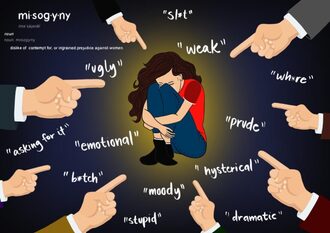
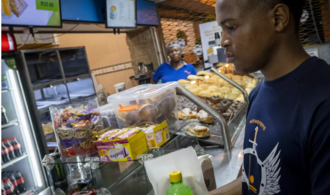
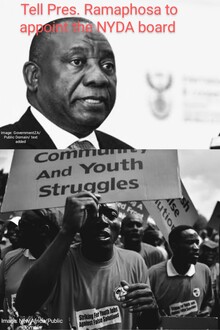

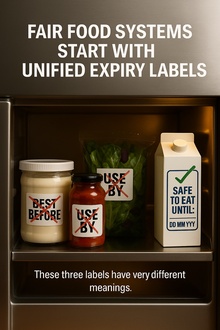
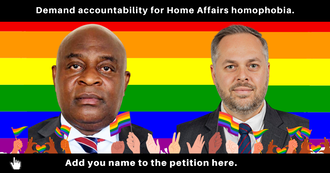.png)
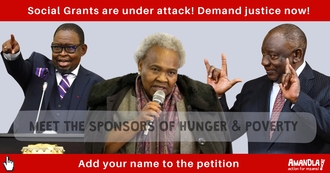
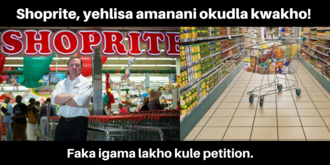
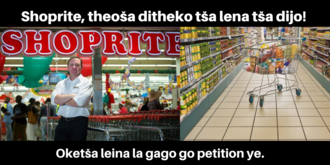
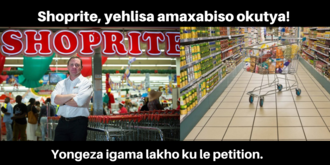.png)
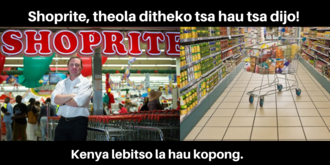
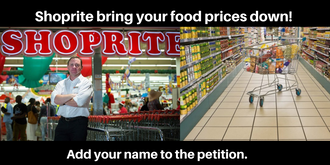.png)